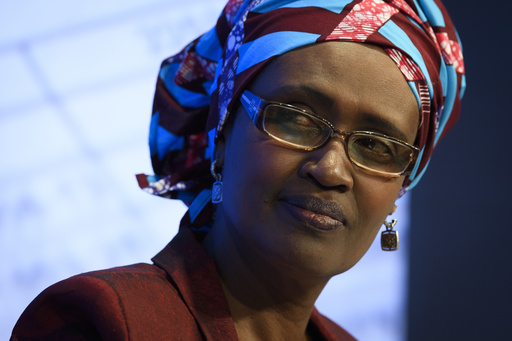LONDON — The leader of the U.N. AIDS agency cautioned on Monday that without continued American support for the largest AIDS program, new HIV infections could potentially soar more than sixfold by the year 2029. This could result in millions of deaths and the emergence of more resistant strains of the virus.
In a recent discussion, Winnie Byanyima, the Executive Director of UNAIDS, highlighted the positive trend in HIV infections, noting a significant decrease in new cases over the past few years. In 2023, there were approximately 1.3 million new infections, reflecting a 60% decline since the virus reached its peak in 1995. However, following the announcement by President Donald Trump that all foreign assistance would be frozen for 90 days, Byanyima expressed concern that the number of new HIV cases might surge to 8.7 million by 2029. She added that AIDS-related deaths could increase tenfold to 6.3 million, leading to another 3.4 million children becoming orphans.
“This will lead to a rebound of this disease,” Byanyima stated from Uganda. She emphasized the critical role of American leadership in the fight against AIDS, asserting that a change in funding policy could have devastating effects. The U.S. halt in funding has caused widespread distress in several African nations, which heavily rely on this support.
For example, in one county in Kenya, the funding cut saw 550 HIV healthcare workers suddenly dismissed, while thousands of health professionals in Ethiopia faced termination, severely hindering infection tracking efforts. Byanyima pointed out that U.S. financial assistance is crucial, as it constitutes about 90% of funding for HIV programs in numerous countries. Countries such as Uganda, Mozambique, and Tanzania alone benefit from nearly $400 million in American aid.
Byanyima urged the Trump administration to reconsider the funding cuts, proposing that rather than abruptly severing support, discussions could be held to reduce contributions gradually. She referred to the American withdrawal from global HIV initiatives as one of the most grave crises the field has encountered, second only to previous delays in access to lifesaving antiretroviral therapies for poorer nations.
Additionally, Byanyima remarked on the timely advent of a promising new prevention tool known as lenacapavir, a biannual injection that reportedly offers complete protection against HIV in women, with effectiveness nearly equivalent for men. She expressed optimism that if this treatment, commercially known as Sunlenca and developed by Gilead, could be widely implemented alongside other prevention strategies, the goal of mitigating HIV as a public health concern could be realized within five years.
Byanyima underscored the irony that American funding has enabled innovations within U.S. pharmaceutical companies while simultaneously working to prevent infections globally. She argued that halting this funding was not only detrimental to public health but also lacked economic rationale. “We urge the U.S. government to revisit this decision, emphasizing its mutual advantages,” she remarked, noting that foreign aid represents less than 1% of total U.S. expenditure. “Why create such disruption over that small fraction?”
So far, there hasn’t been a significant response from other nations or donors to compensate for the expected loss of American support. Nevertheless, Byanyima is planning visits to several European capitals to engage with world leaders on the subject. She warned, “Lives are at stake because essential resources are being withdrawn.” While she acknowledged that no European nation has yet pledged to fill the coming gap, she remains hopeful that they will respond due to their commitment to global health and human rights.




